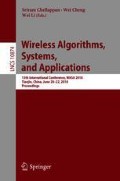Abstract
Due to insufficiency in data collection and analysis by using the existing wearable devices in physical fitness tests for adolescents, this paper presents a machine learning based physical health evaluation model for running activity monitoring, in which a gradient boosting regression algorithm is employed to process physiological data collected from a set of smartbands developed by ourselves. First, we collect two kinds of dynamic data including heart rate and acceleration when students wear our smartbands in a normal running test. Next, several key features closely related to the physical health status are extracted from the dynamic data. A gradient boosting regression (GBR) algorithm is then utilized to train a physical health evaluation model and calculate out a comprehensive score representing physical health status of each student for reference. Experiment results show that not only does the proposed model with GBR achieve higher evaluation accuracy than the one with another typical algorithm—support vector regression (SVR), but it also provides a promising solution for future physical health evaluation by using a machine-learning-model based intelligent computing instead of traditional empirical-model based manual calculation.
Access this chapter
Tax calculation will be finalised at checkout
Purchases are for personal use only
References
Zhen-Wang, B.I.: Physical fitness test of adolescents in Europe and USA. Foreign Med. Sci. (2005)
Wen-hua, Z.H.U.: Analysis of physical health condition of primary and middle school students in Taiyuan City from 1985 to 2014. Chin J Sch. Doct. 31(10), 727–731 (2017)
Zhang, Y., He, L.: Dynamic analysis on physique and health condition of Chinese adolescents based on four national fitness monitoring data from 2000 to 2014. China Youth Study 6, 4–12 (2016)
He, D.: Research and development of public sports information processing system. Chongqing University (2004)
Yu, W.: Research on comprehensive evaluation of the test data of “national student physical health standard” in Hubei Province based on entropy method. Huazhong University of Science and Technology (2016)
He, X., Pan, J., Jin, O., et al.: Practical lessons from predicting clicks on ads at Facebook. In: Proceedings of the Eighth International Workshop on Data Mining for Online Advertising, pp. 1–9. ACM (2014)
Buchheit, M.: Monitoring training status with HR measures: do all roads lead to Rome? Front. physiol. 5, 73 (2014)
Bosquet, L., Gamelin, F.X., Berthoin, S.: Reliability of postexercise heart rate recovery. Int. J. Sports Med. 29(03), 238–243 (2008)
Friedman, J.H.: Greedy function approximation: a gradient boosting machine. Ann. stat. 1189–1232 (2001)
Ajmera, S., Singh, A.K., Chauhan, V.: An approach towards medium term forecasting based on support vector regression. In: Power India International Conference, pp. 1–6. IEEE (2016)
Acknowledgments
This research is sponsored by National Natural Science Foundation of China (No.61401029) and Beijing Advanced Innovation Center for Future Education (BJAICFE2016IR-004).
Author information
Authors and Affiliations
Corresponding author
Editor information
Editors and Affiliations
Rights and permissions
Copyright information
© 2018 Springer International Publishing AG, part of Springer Nature
About this paper
Cite this paper
Yang, L., Guo, J., Dai, Y., Lu, D., Bie, R. (2018). A Gradient-Boosting-Regression Based Physical Health Evaluation Model for Running Monitoring by Using a Wearable Smartband System. In: Chellappan, S., Cheng, W., Li, W. (eds) Wireless Algorithms, Systems, and Applications. WASA 2018. Lecture Notes in Computer Science(), vol 10874. Springer, Cham. https://doi.org/10.1007/978-3-319-94268-1_72
Download citation
DOI: https://doi.org/10.1007/978-3-319-94268-1_72
Published:
Publisher Name: Springer, Cham
Print ISBN: 978-3-319-94267-4
Online ISBN: 978-3-319-94268-1
eBook Packages: Computer ScienceComputer Science (R0)

